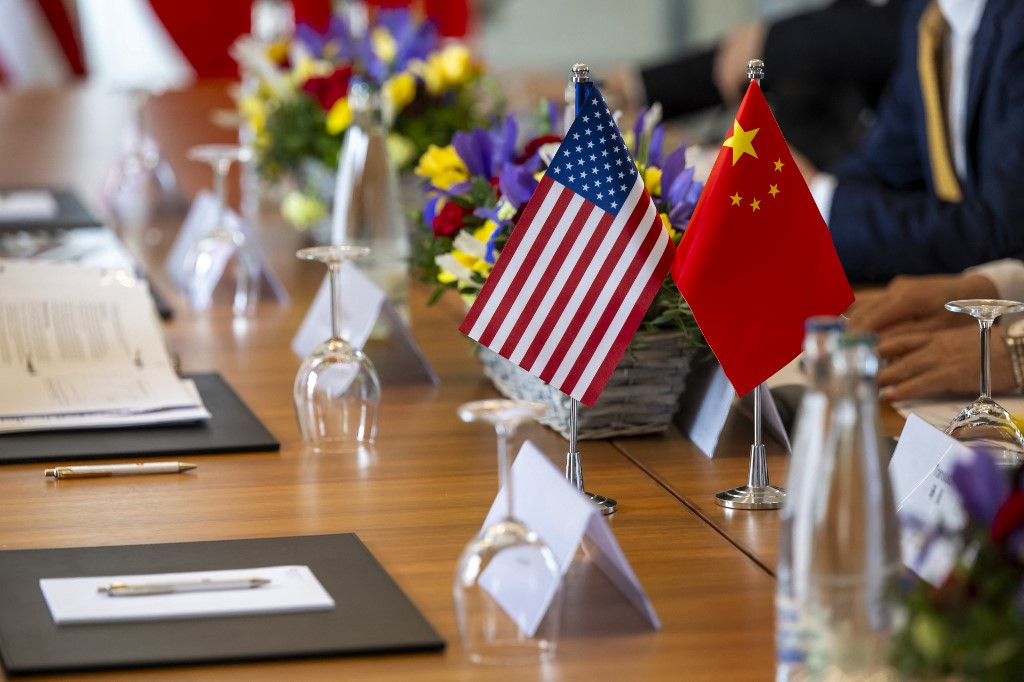The U.S. government sees de-escalation of tensions in the trade war between the U.S. and China as an opportunity. In calling for open and fair trade in negotiations with the U.S. government. with a strict trade barrier policy.
On Monday, Washington and Beijing jointly announced that they had agreed to cut import tariffs. Mutual exports of goods in three digits have been reduced to two digits, and negotiations will continue. U.S. Government China, which had previously responded by raising tariffs on U.S.-made goods by 125 percent, agreed to reduce tariffs to 10 percent, according to U.S. President Donald Trump.
Deni Surjantoro, a spokesman for Indonesia’s Ministry of Finance, told the Jakarta Post. On Tuesday, the development “underscores the effectiveness of diplomacy and negotiations in the The Treasury Department is one of three institutions leading bilateral negotiations with the White House to avoid the 32 percent import tariffs that threaten to be imposed on most Indonesian products exported to the U.S.
Inflated taxes, which Washington describes as a “rewarding” measure. It came into effect on April 9. It was suspended a few hours later for a period of 90 days to allow time for bilateral negotiations.
The spokesman said the ministry views the latest developments between China and the U.S. as a “de-escalation” that will “have a positive impact.” On global trade and investor sentiment He went on to say that the easing of tensions It will improve supply chains and may change global trade in a more diverse but still interconnected direction.
Indonesia can take advantage of this momentum to strengthen its negotiating position in multilateral or bilateral forums, push for more open and fair trade, as well as ensure that national interests are protected, amid continuously evolving global dynamics.” Mr. Deni said.
Mr. Raden Pardede Officials from the Office of the Coordinating Minister for Economic Affairs, which is the agency that led the delegation. From Jakarta, which was sent to Washington last month, said that reducing tensions between the U.S. and China could result in a reduction in tariffs on each other around the world.
He told The Post newspaper on Tuesday that a preliminary agreement that Beijing and Washington jointly drafted It could become a benchmark for Jakarta in tariff negotiations with the U.S. government. However, Raden said that “Trump’s movements remain unpredictable,” which is why the Indonesian government is prepared and ready to mitigate and respond to “unexpected actions.” Any that may occur.
Mrs. Chinta Gandani The president of the Indonesian Employers Association (Apindo) proposed on Tuesday that the landscape of customs duties is changing too rapidly to see universal connectivity. “I don’t know that every time I follow progress, I’m never sure how long something will last. People may say one thing tomorrow or whatever, and other countries may say another,” Shinta said, adding, “In my opinion, the country is not the only country in the world. We should not rely too much on unclear agreements.”
She said Indonesia must be prepared for unexpected events related to the global situation, and in the meantime, it should focus on solving the problem of declining domestic consumer spending. “It’s not that exports are not important, it’s important, but solving the problem of domestic consumption is our homework,” Shinta said.
การใช้จ่ายของครัวเรือนซึ่งคิดเป็นสัดส่วนมากกว่าครึ่งหนึ่งของกิจกรรมทางเศรษฐกิจของอินโดนีเซีย ล้าหลังการเติบโตของผลิตภัณฑ์มวลรวมในประเทศ (GDP) โดยรวมในช่วงไม่กี่ปีที่ผ่านมา นาย Faisal Rachman นักเศรษฐศาสตร์ของธนาคาร Permata ระบุในการแถลงข่าวเมื่อวันพุธว่า แม้จะมีข้อตกลงล่าสุด แต่ภาษีที่สหรัฐฯ และจีนกำหนดต่อผลิตภัณฑ์ของกันและกันยังคงสูงกว่าก่อนสงครามภาษีจะเริ่มขึ้น เขากล่าวว่าสิ่งนี้ จะส่งผลกระทบต่อการเติบโตของ GDP ของอินโดนีเซียโดยอ้อม เนื่องจากอุปสงค์ที่ชะลอตัวจากจีนซึ่งเป็น พันธมิตรทางการค้ารายใหญ่ที่สุดของหมู่เกาะดังกล่าว
นาย Faisal กล่าวว่า “ผลกระทบโดยตรง” สำหรับอินโดนีเซียนั้นส่วนใหญ่จะเกิดขึ้นในเจ็ดอุตสาหกรรมที่พึ่งพา ตลาดส่งออกเป็นหลัก โดยเฉพาะตลาดสหรัฐฯ ซึ่งไม่มีช่องทางในการเปลี่ยนเส้นทางการขายไปยังตลาดในประเทศ อุตสาหกรรมที่เปราะบางตามคำกล่าวของ Faisal ได้แก่ (1) สิ่งทอและเครื่องนุ่งห่ม (2) ยางและผลิตภัณฑ์จากยางและพลาสติก (3) ผลิตภัณฑ์โลหะ คอมพิวเตอร์ อุปกรณ์อิเล็กทรอนิกส์ อุปกรณ์ออปติคอล และไฟฟ้า (4) ไม้ สินค้าที่ทำด้วยไม้ และสินค้าที่ทอจากไม้ไผ่ หวาย และอื่นๆ (5) เครื่องจักรและอุปกรณ์ (6) เฟอร์นิเจอร์และการผลิตอื่นๆ รวมทั้ง (7) หนัง ผลิตภัณฑ์จากหนัง และรองเท้า
ในการให้สัมภาษณ์กับผู้สื่อข่าวหลังการแถลงข่าวเมื่อวันพุธเดียวกัน นายโจชัว ปาเดเด หัวหน้านักเศรษฐศาสตร์ ของธนาคาร Permata กล่าวว่า “หากรัฐบาลจีนและสหรัฐฯ เริ่มผ่อนปรนจุดยืนของแต่ละฝ่าย วอชิงตัน อาจปรองดองกับจาการ์ตาได้มากขึ้น
อย่างไรก็ตาม เขาสันนิษฐานว่าปักกิ่งจะเสนอข้อตกลงประนีประนอมบางอย่างที่ทรัมป์ไม่อาจต้านทานได้ เพื่อไปถึงจุดนั้น ซึ่งหมายความว่าจะเน้นหนักไปที่ข้อเสนอที่เกิดขึ้นในระหว่างการเจรจา
เมื่อพิจารณาจากมุมมองของเขาที่ว่าท้ายที่สุดแล้ว ทรัมป์ต้องการการลงทุนบนดินแดนสหรัฐฯ เพื่อฟื้นฟูอุตสาหกรรมสหรัฐฯ นายโจชัวกล่าวว่าข้อเสนอของจาการ์ตา ซึ่งรวมถึงการลงทุนมูลค่า 2 พันล้านดอลลาร์สหรัฐฯ ในโครงการแอมโมเนียสีน้ำเงินของ Indorama นั้นเป็น “ข้อเสนอที่ทรัมป์ปฏิเสธไม่ได้”
ความคิดเห็นของสำนักงานฯ
การที่สหรัฐฯ และจีนประกาศร่วมกันว่าทั้งสองตกลงที่จะปรับลดอัตราภาษีนำเข้าระหว่างกันลง ทำให้ความตึงเครียดด้านการค้าระหว่างสหรัฐอเมริกาและจีนคลี่คลายลงบางส่วน โดยทั้งสองประเทศตกลงร่วมกันปรับลดอัตราภาษีนำเข้าสินค้าระหว่างกันลงชั่วคราว เป็นเวลา 90 วัน อินโดนีเซียในฐานะประเทศที่มีความสัมพันธ์ทางการค้าทั้งกับจีนและสหรัฐฯ มองพัฒนาการนี้ในเชิงบวก พร้อมทั้งเร่งใช้โอกาสดังกล่าวเจรจากับรัฐบาลสหรัฐฯ เพื่อเลี่ยงมาตรการภาษีตอบโต้ที่อาจกระทบต่อเศรษฐกิจภายในประเทศ การเคลื่อนไหวของอินโดนีเซียสะท้อนให้เห็นถึงการทูตเชิงรุกที่ผสานผลประโยชน์ระดับชาติและภูมิภาค โดยโฆษกกระทรวงการคลังอินโดนีเซียได้ระบุว่า การลดความตึงเครียดทางการค้าระหว่างสหรัฐฯ และจีนเป็นสัญญาณบวกต่อเศรษฐกิจโลก และเปิดช่องให้อินโดนีเซียสามารถต่อรองในเวทีพหุภาคีหรือทวิภาคีได้อย่างมีประสิทธิภาพมากขึ้น ทั้งนี้ การเจรจาเพื่อหลีกเลี่ยงการเก็บภาษีนำเข้าร้อยละ 32 ต่อสินค้าส่งออกอินโดนีเซีย ถือเป็นหนึ่งในกลยุทธ์สำคัญที่สะท้อนถึงความสามารถในการรับมือกับนโยบายการค้าที่คาดเดายากของสหรัฐฯ ในปัจจุบัน อย่างไรก็ตาม ความไม่แน่นอนยังคงเป็นอุปสรรคสำคัญในการวางแผนระยะยาว ภาคเอกชนอินโดนีเซียได้แสดงความกังวลว่า ข้อตกลงที่มีอยู่ยังขาดเสถียรภาพและอาจเปลี่ยนแปลงได้ตลอดเวลา นอกจากนี้ อัตราภาษีที่ยังคงอยู่ในระดับสูงเมื่อเทียบกับช่วงก่อนสงครามการค้า ก็ยังส่งผลกระทบต่อการส่งออกของอินโดนีเซีย โดยเฉพาะใน 7 อุตสาหกรรมหลัก อาทิ สิ่งทอ ยาง อุปกรณ์อิเล็กทรอนิกส์ และเฟอร์นิเจอร์ ซึ่งอาจประสบภาวะชะลอตัวหากไม่สามารถหาตลาดทดแทนได้



